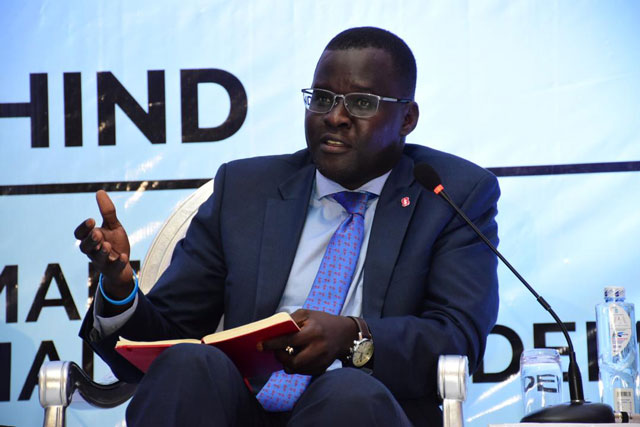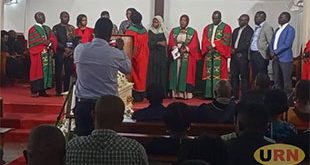
Kampala, Uganda | RONALD MUSOKE | The Lawyers for Lawyers together with the International Commission of Jurists (ICJ) have condemned the ‘spurious’ charges that the government late last year slapped on Ugandan human rights lawyer, Nicholas Opiyo.
In a statement seen by The Independent, the two organizations said the money laundering charges against Opiyo stand to impede the work of human rights lawyers in the country.
“Lawyers for Lawyers and the ICJ call on the Ugandan authorities to drop the spurious charges against Mr. Opiyo and to ensure that his rights to due process and fair trial are fully respected,” the joint statement reads in part.
Opiyo who is the head of Chapter Four Uganda, a civil rights charity that defends human rights and civil liberties in the country, was arbitrarily arrested by plain-clothed men on Dec.22 last year. He was not immediately informed of the reason for his arrest and was detained incommunicado and spent the Christmas holiday in prison.
However, Opiyo was later produced in court and charged under Section 3 (C) of the Anti-Money Laundering Act on allegations that he acquired US$ 340,000 through the bank account of Chapter Four Uganda, knowing that “the said funds were proceeds of crime.”
On Dec. 30, the Anti-Corruption Court granted bail to Opiyo. Justice Kajuga ordered Opiyo to pay Shs 15 million while his sureties including Uganda Law Society President Pheona Wall, the former ULS President Francis Gimara and Sylivia Namubiru, the director of the Legal Aid Service Provider’s Network (LASPNET) were each ordered to pay Shs 100 million not cash.
Speaking about Opiyo’s situation, Sophie de Graaf, the Director of Lawyers for Lawyers said lawyers play a vital role in the protection of the rule of law and human rights in society.
“It is the responsibility of lawyers to protect and establish the rights of citizens from whatever quarter they may be threatened,” she said, “Their work is indispensable for ensuring effective access to justice for all. To fulfill their professional duties effectively, lawyers should be able to practice law freely and independently without any fear of reprisal.”
Kaajal Ramjathan-Keogh, ICJ’s Africa Director added: “Uganda is required under its Constitution and under its international legal obligations to respect and protect the independence of lawyers. These baseless charges seek to intimidate and harass Mr. Opiyo and interfere with his work as a lawyer.”
Article 23 of Uganda’s Constitution, for instance, stipulates that suspects under detention should be brought before a court of law within 48 hours from the time of arrest. Article 27 of Uganda’s Constitution also requires that a person charged with a criminal offence be informed immediately of the charges against them.
Meanwhile, Article 28 of the Uganda Constitution guarantees for every person the right to a fair hearing and the right to legal representation. These rights are protected under the International Covenant on Civil and Political Rights and the African Charter on Human and Peoples Rights, to which Uganda is a party.
Ramjathan-Keogh and de Graaf noted that it appears there are no legitimate grounds for these charges or the ongoing prosecution. “The organizations are further concerned at the numerous alleged violations surrounding the arrest, detention and pre-trial proceedings.”
The two organizations emphasized that the responsible authorities must comply with Uganda’s international legal obligations to ensure that members of the legal professional function without harassment and improper interference, including arbitrary arrest and detention under incommunicado conditions.
Opiyo’s detention and accusations came at a time when several civil society organizations, including the African Commission on Human and Peoples Rights, raised concerns over the pre-election environment in Uganda which was characterized by increased restrictions on civic space.
 The Independent Uganda: You get the Truth we Pay the Price
The Independent Uganda: You get the Truth we Pay the Price




The take home from this article for the man-on-the-street is that the charges against Mr Opio are “baseless” and “spurious”. The eminent lawyers however forgot to tell us how they reached this conclusion. They don’t tell us that they have looked at the evidence against him, or that they have seen exculpatory evidence in his favour.
Which leaves me wondering whether they mean that since Mr Opio is a lawyer and human rights defender, that absolutely excludes any possibility that he could actually fall foul of the law.
If they have not seen the evidence then their own assertions of Opio’s harassment are “baseless” and “spurious”!
I expected more evidence than assertions from international standard lawyers! Have they been misreperesented here by The Independent?
As it is, they seem to me to be simply lawyers defending one of their own with “lawyer tribe” sentiments.